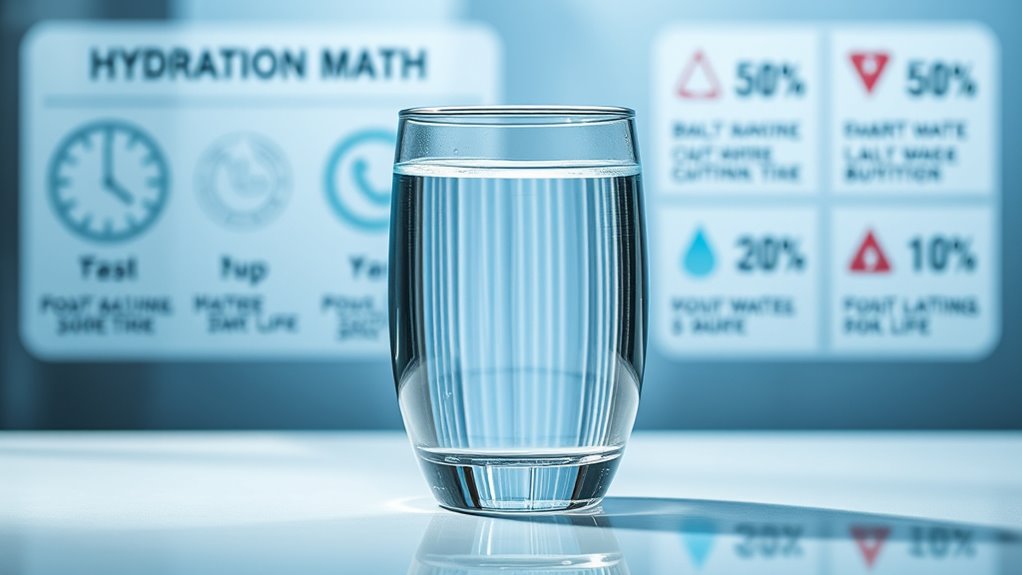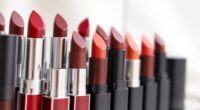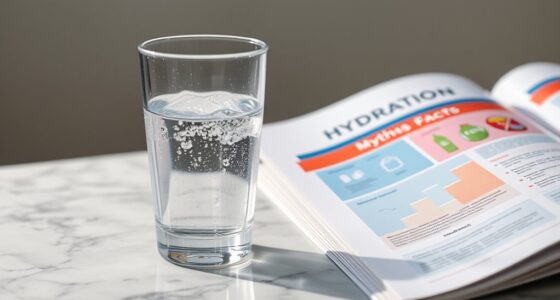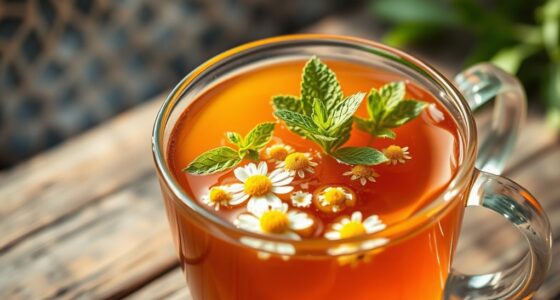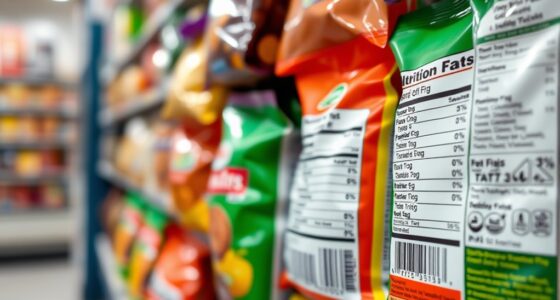Many hydration myths are misleading. Drinking lots of water doesn’t guarantee you’re perfectly hydrated—electrolytes like sodium and potassium are essential for fluid balance. Overhydrating can cause hyponatremia, a dangerous electrolyte imbalance, while drinking too little leads to dehydration. Urine color alone isn’t enough to judge hydration, and feeling energized doesn’t mean you’re fully balanced. To truly optimize hydration, you need to understand the role of electrolytes—if you want to learn more, keep exploring this topic.
Key Takeaways
- Drinking large amounts of water alone doesn’t ensure optimal hydration; electrolyte balance is essential.
- Clear urine isn’t always a sign of good hydration; overhydration can dilute electrolytes and cause health issues.
- Overhydration can lead to hyponatremia, a dangerous condition resulting from low blood sodium levels.
- Proper hydration requires balancing fluid intake with electrolytes like sodium and potassium, not just drinking water.
- Hydration effectiveness depends on bodily electrolyte levels, supporting nerve function, muscle activity, and pH regulation.
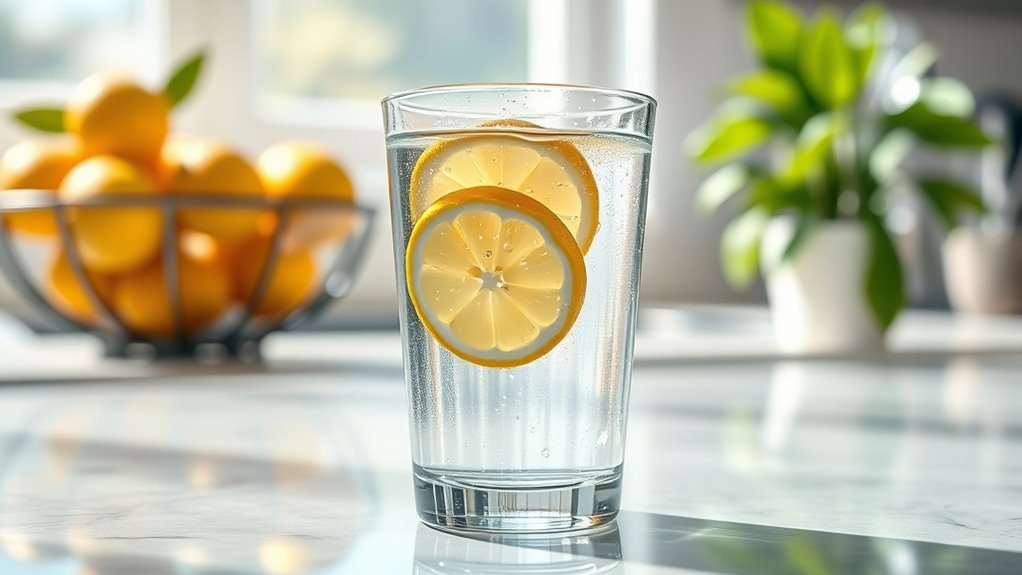
Have you ever wondered if you’re truly drinking enough water? Many people assume that simply gulping down large amounts of water automatically leads to proper hydration, but that’s not entirely accurate. The key to staying well-hydrated isn’t just about quantity; it’s about achieving ideal hydration, which involves a delicate balance of fluids and electrolytes. When you focus solely on drinking water, you might overlook the importance of electrolyte balance, which is essential for your body’s overall function.
Electrolytes like sodium, potassium, magnesium, and chloride play a critical role in maintaining fluid levels inside and outside your cells. If your electrolyte balance is off, even drinking plenty of water won’t guarantee proper hydration. Instead, you could experience symptoms like muscle cramps, fatigue, or dizziness. That’s because your body needs a proper mix of water and electrolytes to support processes such as nerve signaling, muscle contraction, and pH regulation. Without this balance, your hydration efforts won’t be as effective as you think. Additionally, understanding the types of hydration can help optimize your intake for better health.
Many hydration myths suggest that the more water you drink, the better. While staying adequately hydrated is crucial, overhydration can be just as problematic as dehydration. Drinking excessive amounts of water without replenishing electrolytes can lead to a condition called hyponatremia, where blood sodium levels become dangerously low. This highlights the importance of not only drinking enough water but also ensuring your body maintains electrolyte harmony. Consuming electrolyte-rich beverages during intense exercise or hot weather can help support this balance, making your hydration more effective.
You might also believe that if your urine is clear, you’re perfectly hydrated. While light-colored urine is a good sign, it doesn’t tell the whole story. Sometimes, clear urine indicates overhydration, which can dilute essential electrolytes and disturb your body’s fluid equilibrium. Instead, pay attention to how you feel—if you’re energized, your muscles aren’t cramping, and you don’t feel dizzy, you’re likely close to ideal hydration.
Frequently Asked Questions
Can You Hydrate Effectively With Other Beverages Besides Water?
Yes, you can hydrate effectively with other beverages besides water. Alternative beverages like herbal teas, milk, and electrolyte drinks serve as good hydration sources, especially during activities or in hot weather. Just keep in mind that some drinks, like sodas or sugary juices, may have added sugars or caffeine. Choosing nutritious options guarantees you stay well-hydrated without compromising your health.
Does Drinking Water Before Bed Prevent Dehydration Overnight?
Did you know that staying hydrated can improve sleep quality? Drinking water before bed can help maintain fluid absorption and prevent dehydration overnight, which often disrupts sleep. While it’s beneficial, drinking too much might cause frequent trips to the bathroom, interrupting rest. To optimize hydration and sleep, sip small amounts of water before bed, but avoid excess. This way, you support better sleep without disturbing it.
Is It Necessary to Drink Water Immediately After a Workout?
You might wonder if you need to drink water immediately after a workout. The answer is yes, post-work hydration helps replenish lost fluids and supports recovery. Hydration timing matters, so aim to drink water within 30 minutes of finishing exercise. This ensures your body rehydrates efficiently, preventing dehydration and aiding muscle repair. Don’t wait too long—prompt hydration is key to feeling your best and maintaining ideal performance.
Can Overhydration Be Dangerous or Harmful?
Overhydration can be dangerous because it may cause electrolyte imbalance, leading to symptoms like nausea, confusion, or even seizures. When you drink too much water, your kidneys stress trying to eliminate excess fluid, which can impair their function over time. To stay safe, listen to your body’s signals, drink when you’re thirsty, and balance water intake with electrolytes, especially during intense exercise or heat.
Do Different Types of Water (Sparkling, Filtered, Mineral) Hydrate Differently?
You might wonder if different water types hydrate differently. Sparkling, filtered, and mineral waters all contain varying water compositions and mineral content, which can influence hydration. Mineral-rich waters provide essential electrolytes, aiding absorption, while sparkling water’s carbonation doesn’t affect hydration. Ultimately, all these types hydrate you effectively, but your choice can be influenced by taste and mineral benefits. Focus on drinking enough water regardless of the type.
Conclusion
Don’t fall for flawed facts or fictions about hydration. By busting these bold but baseless beliefs, you’ll better understand your body’s true thirst cues and hydration needs. Remember, moderation is mighty, and overdoing or underdoing water can cause complications. Embrace evidence over exaggeration, stay savvy, and sip smartly. Stay spirited, stay hydrated, and steer clear of sensationalized myths—because your health hinges on honest hydration habits, not hollow hearsay.
